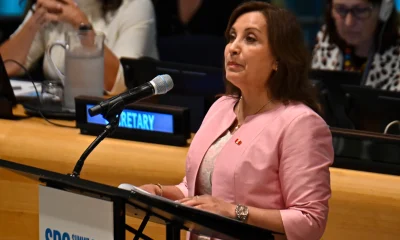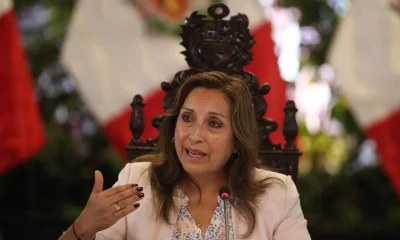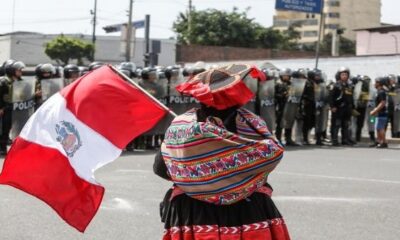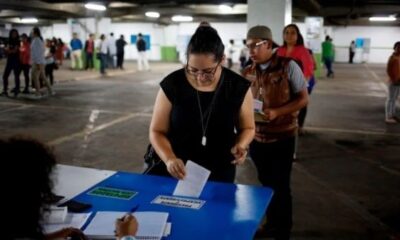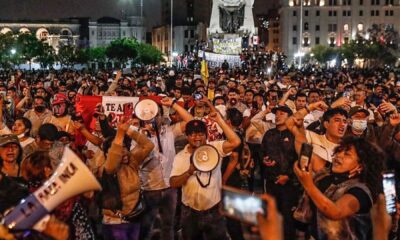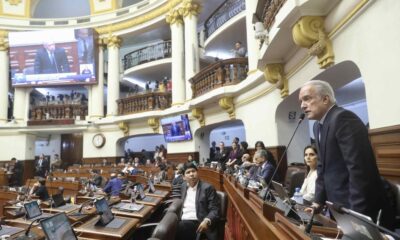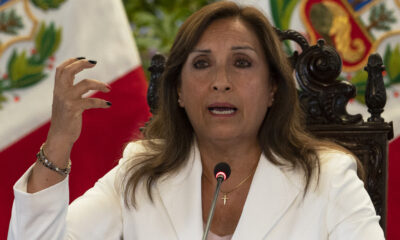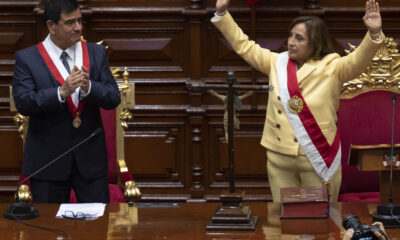International
Peru Congress rejects snap election, president asks to try again
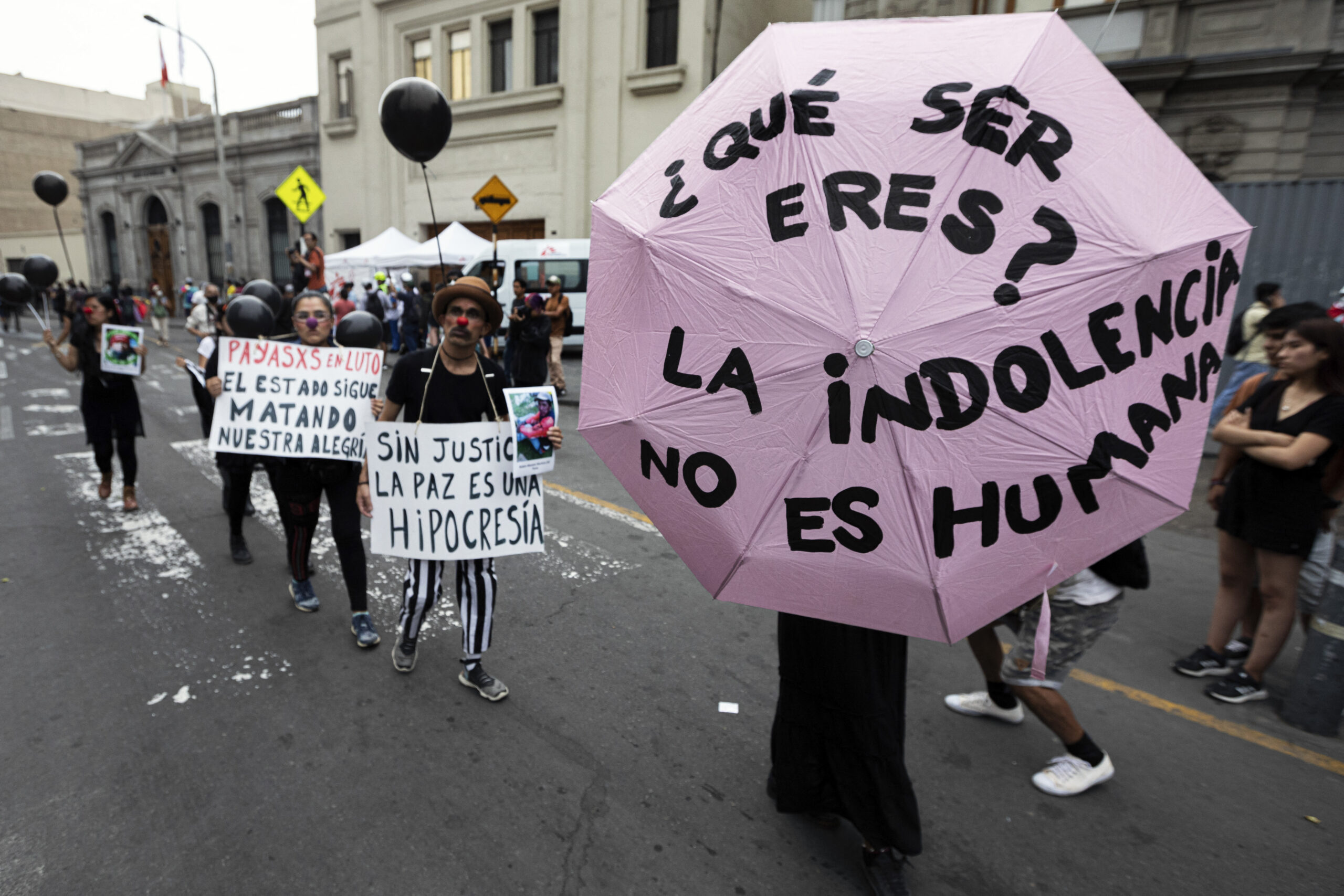
January 29 | By AFP | Paula Bustamante |
Peru’s embattled president Dina Boluarte on Saturday urged lawmakers to find a way out of a deepening political crisis by agreeing to snap elections in December, just hours after Congress voted against the idea.
In the early hours of Saturday, lawmakers had rejected her request to move elections forward to December, even as anti-Boluarte protests raging across the country have left dozens dead.
“We regret that the Congress of the Republic has been unable to define the date of general elections where Peruvians can freely and democratically elect the new authorities,” Boluarte said on Twitter Saturday.
She urged politicians to “put down their partisan interests and place the interests of Peru above them.”
The South American country has been embroiled in a political crisis with near-daily protests since December 7, when former president Pedro Castillo was arrested after attempting to dissolve Congress and rule by decree.
Demanding that Boluarte resign and call fresh elections, Castillo supporters have blocked highways, causing shortages of food, fuel and other basic supplies. The government said it will soon deploy police and soldiers to clear the roadblocks.
No interest in ‘clinging to power’
Lawmakers had agreed last month to bring forward elections from 2026 to April 2024.
But in the face of relentless protests, Boluarte on Friday urged Congress to move the vote up further, to December.
However, at a plenary session that ended early Saturday, Congress rejected the proposal, with 45 votes in favor, 65 against and two abstentions.
Demonstrators are calling for immediate elections, as well as Boluarte’s removal, the dissolution of Congress and a new constitution.
“Nobody has any interest in clinging to power,” Boluarte insisted on Friday. “If I am here it is because I fulfilled my constitutional responsibility.”
As Castillo’s vice president, Boluarte was constitutionally mandated to replace him after he was impeached by Congress and arrested.
The US State Department on Friday urged dialogue and restraint by all parties.
‘Everything is very expensive’
In seven weeks of demonstrations, 47 people have been killed in clashes between security forces and protesters, according to the Ombudsman’s Office of Peru.
The autonomous human rights office said an additional 10 civilians, including two babies, died when they were unable to get medical treatment or medicine due to roadblocks.
In southern regions, roadblocks have resulted in widespread shortages.
Some of the worst violence and highest death tolls have come when protesters tried to storm airports in the south.
Southern regions with large Indigenous populations have been the epicenter of the protest movement that has affected Peru’s vital tourism industry.
As well as blocking dozens of roads and forcing the temporary closure of several airports, protesters have placed rocks on the train tracks that act as the only transport access to Machu Picchu, the former Inca citadel and jewel of Peruvian tourism.
Hundreds of tourists were stranded at the archeological ruins, with many eventually evacuated by helicopter.
International
U.S. Senate Rejects Budget, Bringing Government Closer to Shutdown Amid DHS Dispute

The U.S. Senate voted on Thursday against a budget proposal in a move aimed at pressuring changes at the Department of Homeland Security (DHS), following the killing of two civilians during a deployment of immigration agents in Minneapolis.
All Senate Democrats and seven Republican lawmakers voted against the bill, which requires 60 votes to advance, pushing the country closer to a partial government shutdown that would cut funding for several agencies, including the Pentagon and the Department of Health.
The rejection came as Senate leaders and the White House continue negotiations on a separate funding package for DHS that would allow reforms to the agency. Proposed measures include banning Immigration and Customs Enforcement (ICE) agents from wearing face coverings and requiring them to use body-worn cameras during operations.
The vote took place just hours after President Donald Trump said he was “close” to reaching an agreement with Democrats and did not believe the federal government would face another shutdown, following last year’s record stoppage.
“I don’t think the Democrats want a shutdown either, so we’ll work in a bipartisan way to avoid it. Hopefully, there will be no government shutdown. We’re working on that right now,” Trump said during a Cabinet meeting at the White House.
International
Trump Says Putin Agreed to One-Week Halt in Attacks on Ukraine Amid Extreme Cold

U.S. President Donald Trump said on Thursday that he secured a commitment from Russian President Vladimir Putinto halt attacks against Ukraine for one week, citing extreme weather conditions affecting the region.
“Because of the extreme cold (…) I personally asked Putin not to attack Kyiv or other cities and towns for a week. And he agreed. He was very pleasant,” Trump said during a Cabinet meeting broadcast by the White House.
Trump acknowledged that several advisers had questioned the decision to make the call.
“A lot of people told me not to waste the call because they wouldn’t agree. And he accepted. And we’re very happy they did, because they don’t need missiles hitting their towns and cities,” the president said.
According to Trump, Ukrainian authorities reacted with surprise to the announcement but welcomed the possibility of a temporary ceasefire.
“It’s extraordinarily cold, record cold (…) They say they’ve never experienced cold like this,” he added.
Ukrainian President Volodymyr Zelensky later commented on the announcement, expressing hope that the agreement would be honored.
International
Storm Kristin Kills Five in Portugal, Leaves Nearly 500,000 Without Power

Storm Kristin, which battered Portugal with heavy rain and strong winds early Wednesday, has left at least five people dead, while nearly half a million residents remained without electricity as of Thursday, according to updated figures from authorities.
The revised death toll was confirmed to AFP by a spokesperson for the National Emergency and Civil Protection Authority (ANPEC). On Wednesday, the agency had reported four fatalities.
Meanwhile, E-Redes, the country’s electricity distribution network operator, said that around 450,000 customers were still without power, particularly in central Portugal.
Emergency services responded to approximately 1,500 incidents between midnight and 8:00 a.m. local time on Wednesday, as the storm caused widespread disruptions.
The Portuguese government described Kristin as an “extreme weather event” that inflicted significant damage across several regions of the country. At the height of the storm, as many as 850,000 households and institutions lost electricity during the early hours of Wednesday.
Several municipalities ordered the closure of schools, many of which remained shut on Thursday due to ongoing adverse conditions.
Ricardo Costa, regional deputy commander of the Leiria Fire Brigade, said residents continue to seek assistance as rainfall persists.
“Even though the rain is not extremely intense, it is causing extensive damage to homes,” he noted.
In Figueira da Foz, a coastal city in central Portugal, strong winds toppled a giant Ferris wheel, underscoring the severity of the storm.
-

 Central America4 days ago
Central America4 days agoGuatemala seizes over a ton of cocaine hidden in flour at Pacific port
-

 International4 days ago
International4 days agoHistoric snowstorm paralyzes Toronto after 60 centimeters of snow
-

 Central America3 days ago
Central America3 days agoGuatemala Police Arrest Prison Guard Caught in the Act of Extortion
-

 Central America3 days ago
Central America3 days agoHonduras swears in conservative president Asfura after disputed election
-

 Central America3 days ago
Central America3 days agoBukele leads public trust rankings as UCA survey highlights gains in security
-

 International4 days ago
International4 days agoSpain’s irregular migrant population rises to 840,000, study finds
-

 International2 days ago
International2 days agoFootball Fan Killed in Clashes After Colombian League Match
-

 International3 days ago
International3 days agoWinter Storm Fern Leaves 30 Dead and Over One Million Without Power Across the U.S.
-

 Central America2 days ago
Central America2 days agoGuatemala President Says Starlink Terminal Found Inside Prison
-

 Sin categoría3 days ago
Sin categoría3 days agoEight Killed in Series of Armed Attacks in Ecuador’s Manabí Province
-

 International3 days ago
International3 days agoDoomsday clock moves to 85 seconds before midnight amid rising global risks
-

 International4 days ago
International4 days agoRights group says nearly 6,000 killed in Iran protest crackdown
-

 International3 days ago
International3 days agoSpain approves plan to regularize up to 500,000 migrants in Historic Shift
-

 Sin categoría3 days ago
Sin categoría3 days agoEl Salvador Launches Fourth Year of Ocean Mission to Protect Marine Ecosystems
-

 International2 days ago
International2 days agoRubio Says U.S. Could Participate in Follow-Up Russia-Ukraine Talks
-

 International2 days ago
International2 days agoMissing Spanish Sailor Rescued After 11 Days Adrift in Mediterranean
-

 International4 days ago
International4 days agoVenezuela frees at least 80 political prisoners, NGO says
-

 International4 days ago
International4 days agoEU launches new probe into X over AI-generated fake nude images
-

 International18 hours ago
International18 hours agoU.S. Senate Rejects Budget, Bringing Government Closer to Shutdown Amid DHS Dispute
-

 International4 days ago
International4 days agoSevere winter storm grips U.S., leaves multiple dead as extreme cold persists
-

 International4 days ago
International4 days agoFrance debates ban on social media for children under 15
-

 International18 hours ago
International18 hours agoStorm Kristin Kills Five in Portugal, Leaves Nearly 500,000 Without Power
-

 International18 hours ago
International18 hours agoMan Arrested After Vehicle Crashes Into Jewish Institution in Brooklyn
-

 International18 hours ago
International18 hours agoTrump Says Putin Agreed to One-Week Halt in Attacks on Ukraine Amid Extreme Cold



























